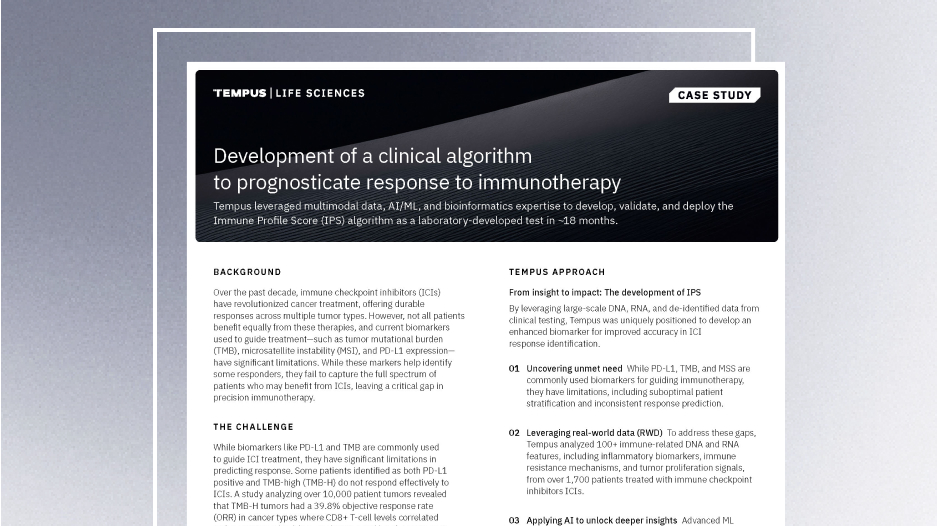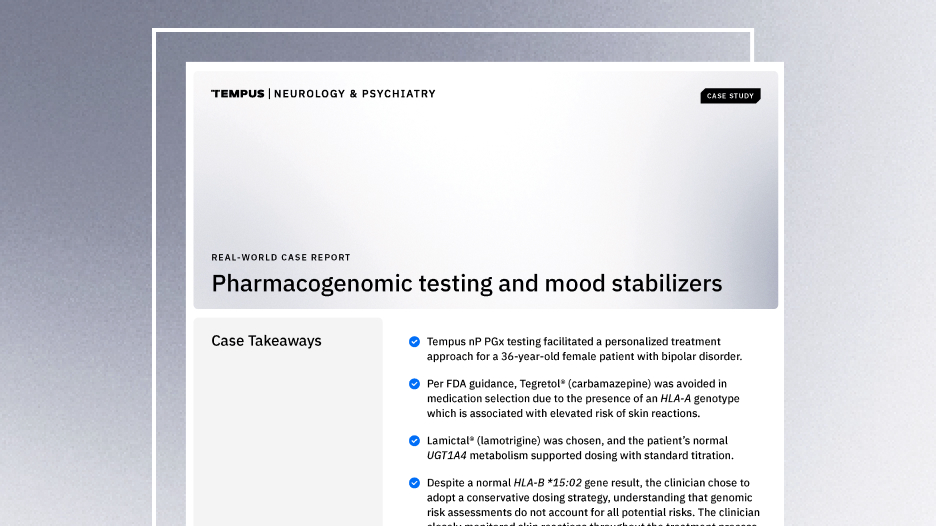-
PROVIDERS
Register now
Are you getting the full picture? A webinar series on the power of comprehensive intelligent diagnostics
-
LIFE SCIENCES
Enroll now
Tempus’ Patient-Derived Organoid ScreensEvaluate the efficacy of your preclinical compounds using fixed organoid panels designed for diverse therapeutic applications. Space is limited — enroll by June 30, 2025, to secure your spot.
-
PATIENTS
It's About Time
View the Tempus vision.
- RESOURCES
-
ABOUT US
View Job Postings
We’re looking for people who can change the world.
- INVESTORS
03/25/2024
Tempus Announces the Clinical Launch of p-MSI, its MSI-High Predictive Algorithm for Patients with Prostate Cancer
Tempus, a leader in artificial intelligence and precision medicine, today announces the clinical launch of p-MSI, a digital pathology algorithm using H&E whole slide images that is available with the company’s xT assay for patients with prostate cancer. This offering aims to identify patients who may be more likely than the average patient with prostate cancer to have a tumor that is microsatellite instability high (MSI-H), and therefore potentially eligible for immunotherapy.
p-MSI is Tempus’ first clinically available digital pathology algorithm, and its results must be confirmed through a tissue-based test. The model supports physicians in making an informed decision whether or not to pursue further testing that would confirm MSI status. MSI is a biomarker caused by a deficiency in DNA mismatch repair and is associated with response to immune checkpoint inhibitor therapy1 and can also be associated with Lynch syndrome. In prostate cancer, MSI is uncommon and is not typically tested for, but has been reported at ~2-3% prevalence2.
At the 2024 United States and Canadian Academy of Pathology’s (USCAP) Annual Meeting, Tempus is presenting a study, titled “Robustness of Deep Learning Histogenomic Models to Tissue Area, Tumor Purity, and Scanner Type,” which sought to evaluate the operating and specimen parameters required in order for an MSI prediction model to perform robustly in a cohort of prostate cancer biopsies. The study found that AI-powered models can predict which patients are more likely to be MSI-H based on whole slide H&E images.
“MSI-H status is a tumor agnostic biomarker of response to immune checkpoint inhibitor therapy, so we’re excited to introduce this new model as part of our AI-enabled clinical offerings,” said Nike Beaubier, MD, Senior Vice President, Life Science Pathology. “p-MSI joins our growing portfolio of models that support physicians in mapping out treatment plans that are specifically tailored to their individual patients.”
About Tempus
Tempus is a technology company advancing precision medicine through the practical application of artificial intelligence in healthcare. With one of the world’s largest libraries of multimodal data, and an operating system to make that data accessible and useful, Tempus provides AI-enabled precision medicine solutions to physicians to deliver personalized patient care and in parallel facilitates discovery, development and delivery of optimal therapeutics. The goal is for each patient to benefit from the treatment of others who came before by providing physicians with tools that learn as the company gathers more data. For more information, visit tempus.com.
1Kavun A, Veselovsky E, Lebedeva A, et al. Microsatellite instability: a review of molecular epidemiology and implications for immune checkpoint inhibitor therapy. Cancers (Basel). 2023;15(8):2288.
2Abida W, Cheng ML, Armenia J, et al. Analysis of the prevalence of microsatellite instability in prostate cancer and response to immune checkpoint blockade. JAMA Oncol. 2019;5(4):471-478.
-
04/02/2025
Development of a clinical algorithm to prognosticate response to immunotherapy
Discover how Tempus developed and deployed the Immune Profile Score (IPS)—a powerful algorithm that provides prognostic insights into patient outcomes following treatment with immune checkpoint inhibitors (ICIs)—in ~18 months. This case study highlights the AI-driven methodology, real-world validation, and the impact of IPS in precision oncology.
Read more -
03/25/2025
AI & ML in action: Unlocking RWD with GenAI through Tempus Lens
Discover how Tempus is equipping researchers with innovative AI solutions to fully leverage the potential of multimodal data. Gain insights from a panel of leaders across healthcare and life sciences as they discuss the impact of these advanced tools on delivering insights with speed.
Watch replay
Secure your recording now. -
03/11/2025
Case Report: Pharmacogenomic testing and mood stabilizers
This real-world case demonstrates how the Tempus nP pharmacogenomic test facilitated a personalized treatment approach for a patient with bipolar disorder.
Read more


